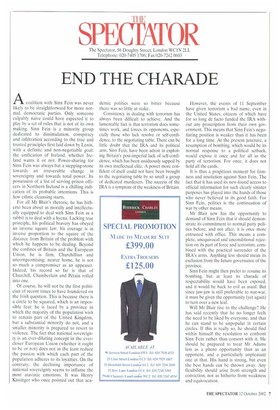SPEdATOR
The Spectator, 56 Doughty Street, London WC1N 2LL Telephone: 020-7405 1706; Fax 020-7242 0603
END THE CHARADE
Acoalition with Sinn Fein was never likely to be straightforward for more normal, democratic parties. Only someone culpably naive could have expected it to play by a set of rules that is not of its own making. Sinn Fein is a minority group dedicated to dissimulation, conspiracy and infiltration according to the true and trusted principles first laid down by Lenin, with a definite and non-negotiable goal: the unification of Ireland. whether Ireland wants it or not. Power-sharing for Sinn Fein was always but a stepping-stone towards an irreversible change in sovereignty and towards total power. Its possession of a list of serving prison officers in Northern Ireland is a chilling indication of its probable intentions. This is how ethnic cleansing starts.
For all Mr Blair's rhetoric, he has hitherto been about as morally and intellectually equipped to deal with Sinn Fein as a rabbit is to deal with a hyena. Lacking true principle, his political bravery has obeyed an inverse square law: his courage is in inverse proportion to the square of the distance from Britain of the problem with which he happens to be dealing. Beyond the confines of Britain and the European Union. he is firm, Churchillian and uncompromising; nearer home, he is not so much a compromiser as an appeaser. Indeed, his record so far is that of Churchill. Chamberlain and Petain rolled into one.
Of course, he will not be the first politician of recent times to have foundered on the Irish question. This is because there is a circle to be squared, which is an impossible feat: he is faced by a province in which the majority of the population wish to remain part of the United Kingdom, but a substantial minority do not, and a smaller minority is prepared to resort to violence. The fact that national sovereignty is an ever-diluting concept in the evercloser European Union (whether it ought to be or not) does not in the least reduce the passion with which each part of the population adheres to its loyalties. On the contrary: the declining importance of national sovereignty seems to inflame the most atavistic emotions. It was Henry Kissinger who once pointed out that aca demic politics were so bitter because there was so little at stake.
Consistency in dealing with terrorism has always been difficult to achieve, And the lamentable fact is that terrorism does sometimes work, and forces its opponents, especially those who lack resolve or self-confidence, to the negotiating table. There can be little doubt that the IRA and its political arm, Sinn Fein. have been adroit in exploiting Britain's post-imperial lack of self-confidence, which has been assiduously sapped by its own intellectual elite. A power more confident of itself could not have been brought to the negotiating table by so small a group of dedicated murderers. The success of the IRA is a symptom of the weakness of Britain.
Howe%er, the events of 11 September have given terrorism a bad name, even in the United States, citizens of which have for so long de facto funded the IRA without any proscription from their own government. This means that Sinn Fein's negotiating position is weaker than it has been for a long time. At the present juncture, a resumption of bombing, which would be its normal response to a political setback, would expose it once and for all as the party of terrorism. For once, it does not hold all the cards.
It is thus a propitious moment for firmness and resolution against Sinn Fein. The fact that it has used its new-found access to official information for such clearly sinister purposes has played into the hands of those who never believed in its good faith. For Sinn Fein, politics is the continuation of war by other means.
Mr Blair now has the opportunity to demand of Sinn Fein that it should demonstrate its commitment to normal party politics before, and not after, it is once more entrusted with office. This means a complete, unequivocal and unconditional rejection on its part of force and terrorism, combined with the practical surrender of the IRA's arms. Anything less should mean its exclusion from the future governance of the province.
Sinn Fein might then prefer to resume its bombing, but at least its charade of respectability would have been exposed, and it would be back to evil as usual. But since jaw-jaw is still preferable to war-war, it must be given the opportunity (yet again) to turn over a new leaf.
Will Mr Blair rise to the challenge? He has said recently that he no longer feels the need to be liked by everyone, and that he can stand to be unpopular in certain circles. If this is really so, he should find within himself the resolution to confront Sinn Fein rather than consort with it. He should be prepared to treat Mr Adams less as a photo opportunity than as an opponent, and a particularly unpleasant one at that. His hand is strong, but even the best hands can be thrown away. Any flexibility should arise from strength and conviction, not as hitherto from weakness and equivocation.


































































































 Previous page
Previous page